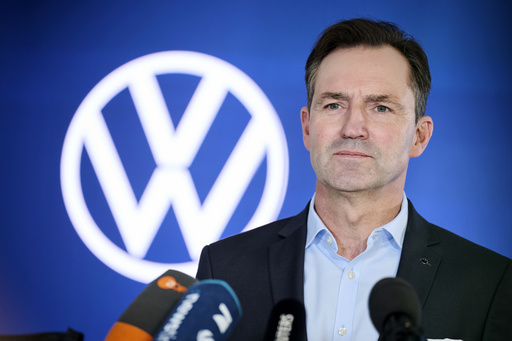
Volkswagen has successfully negotiated a wage agreement with employee representatives that secures jobs for 120,000 German workers until 2030. This agreement, announced on Friday, includes provisions to prevent involuntary layoffs and plant closures throughout the duration of the contract. Furthermore, it outlines a plan for the company to reduce its workforce by over 35,000 positions through early retirements and voluntary buyouts by the end of the decade.
The negotiations, which extended into the late hours, were prompted by Volkswagen’s need to adapt to decreasing demand in Europe, rising material costs, and growing competition from Chinese car manufacturers. Currently, Volkswagen has experienced a downturn in sales, resulting in the loss of potential sales equivalent to 500,000 vehicles annually, roughly the production capacity of two of its factories.
This new deal is projected to save the company about 1.5 billion euros (approximately $1.56 billion) each year in labor expenses. Additionally, by restructuring its manufacturing operations across German facilities, Volkswagen aims to cut production capacity by more than 700,000 vehicles annually, generating further savings of around 4 billion euros.
The accomplishment of this agreement without significant plant closures highlights the influence of employee representatives and the Lower Saxony state government—who hold a majority on Volkswagen’s board—granting them substantial bargaining power during negotiations. A senior Volkswagen executive praised the agreement, noting that it aligns with the company’s strategic goals. “We focused on three main areas during our discussions: addressing overcapacity at German facilities, minimizing labor costs, and making development expenses more competitive,” stated Thomas Schaefer, the head of the Volkswagen brand. He expressed satisfaction with the sustainable solutions achieved in these key areas.
Thorsten Groeger, from the IG Metall union, acknowledged that employees have accepted some difficult compromises as part of the agreement. Although there will be a reduction in bonus payments and other forms of compensation, the base wage will remain intact. Volkswagen had initially proposed a 10% pay cut to address cost issues.
The company emphasized its need to align costs in Germany with those of its competitors and its facilities in Eastern Europe and South America. While major plant closures were avoided, production at the Dresden factory is slated to conclude at the end of next year as previously scheduled, and the Osnabrueck plant will focus solely on manufacturing T-Roc SUVs until mid-2027, after which alternative uses for the site will be explored. Daniela Cavallo, a leading employee representative, mentioned the possibility of repurposing the Dresden plant in collaboration with unspecified organizations.
In a significant operational shift, Volkswagen announced the transfer of its Golf production from the Wolfsburg plant to Puebla, Mexico. Consequently, the assembly lines in Wolfsburg will be reduced from four to two, dedicated to producing the ID.3 and CUPRA Born compact vehicles, leading to the elimination of approximately 4,000 jobs in vehicle development at the Wolfsburg facility.
